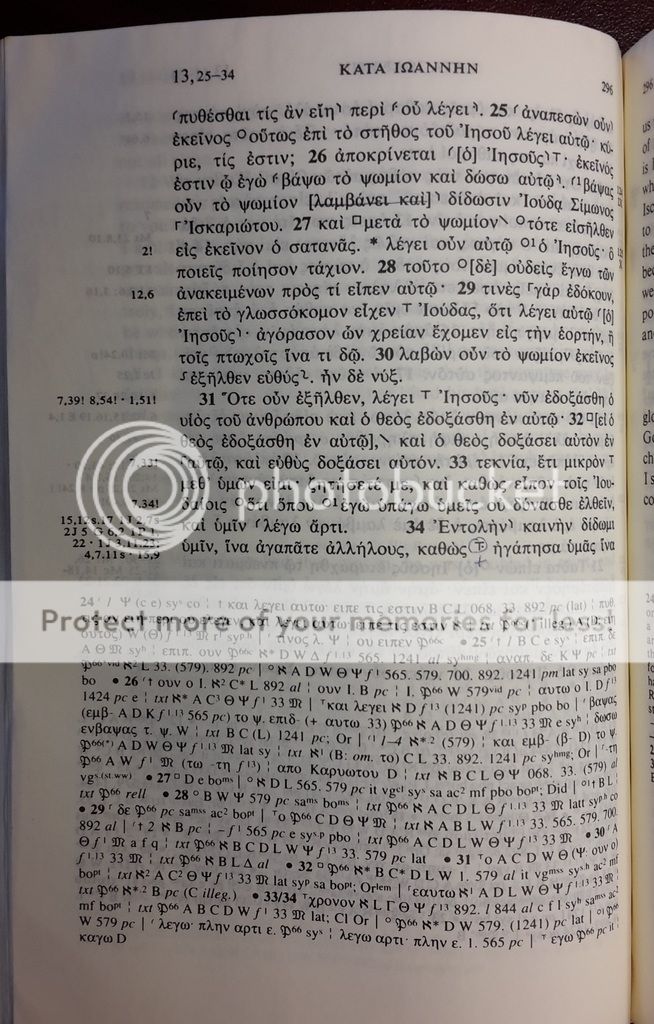BilliardsBall
Veteran Member
1) Clear asked : "How does a modern theory that original but non-existent manuscripts apply to individuals who only have and interact with manuscripts and bibles that have errors? What application is there for such a theory other than to create a bragging point?"
Billiardsball responded : "Because over 99.5% of the text is demonstrably accurate and surely contained what the originals contained!"
I asked what the application is for an erroneous theory, other than a bragging point, and, you respond with a bragging point. This has to be the epitome of irony. Confirming my point will not restore life to your theory of inerrancy.
While you, as a non-historian may assume that the current text "surely contained what the originals contain", this naive assumption is another counter-historical theory. Since no scholar in the world knows what the original autographic texts contained, and since these texts do not exist, we cannot know what they said. We can know what extant texts tell us. Those are the limitations of authentic and real of history and the difference between history and bragging.
Your theory of inerrancy is dead. No amount of pseudofact or bragging can bring it back to life.
2) Billiardsball asked : "Are you willing to state the over 99.5% of Mormon canonical books are true?
I've explained that my belief is that ALL ancient records have errors, including all books the Mormons refer to as “canonical”. However, my belief that other records also contain error is irrelevant since, whether they are errant or inerrant, it will not restore life to your biblical inerrancy theory.
3) Clear said : “This is the moral problem with your theory that once a person believes in God and Jesus, even IF they stop believing and then choose to knowingly follow Satan and rape and molest and murder little children. In your theory, they still receive a heavenly reward despite continuing to freely choose evil.”
Billiardsballs replied : “... I never promulgated this “theory”.
In the God in Mormonism thread you DID promulgate this theory.
If you remember, your theory was that once one “got on the bus” to heaven by accepting salvation, one could not then, get back off the bus regardless of these sins. You offered multiple examples of this theory that no one could leave the heaven bound bus once they accepted Christ regardless of these sins. You said : “ Would it be better to simply say that the bus driver stops for us and says, "Next stop, Heaven!" I was on a bus the other day where someone asked to be let out in a dangerous place mid-block, and the bus driver said, "We have to go to the next stop. That is the rule." (Billiardsball, post # 179)
Your theory removed moral choice from the equation. This defect in your theory is partly why Orontes spent considerable time, exposing the flaws in this theory you promulgated.
In post # 190, speaking against your theory, Orontes said : “An automatic salvation system reference is based on your earlier comments. You have stated you "have no choice in the matter" "you nature has been changed" and have had issues with simply agreeing in your bus/salvation analogy that one could get off the bus. If one cannot leave, they are bound/ captured. Since your stance is the bus is to salvation and heaven, riders are bound for heaven regardless of will or action. This is where all the problems reside. It repudiates free will and morality. If you hold one maintains their free will (which means one can choose differently) then the problems go away. Can one get off the bus?”
Over and over you tried to maintain that one could not get off the "heaven-bound" bus despite committing these sorts of despicable sins. It was in response to your theory that I said : “Heaven cannot BE inhabited by individuals still intent on rape, molesting and murder. We have already been over this issue in the “God in Mormonism” thread. You still remember the results of that discussion I presume?”
Do you remember now? Do you want me to quote more of what you said to help you remember this point and make it more clear to you and to readers? This theory that one may torture and rape children and oppress will still NOT resurrect the dead inerrancy theory.
If you now, however, repudiate this idea and feel that such individuals must repent and change before they can be saved in heaven, then I will accept your word that you no longer believe in this theory of "salvation without repentance".
4) When Clear suggested the Holy Ghost also served as confirmation of God’s existence and confirmation that Jesus is the Savior of mankind, billiardsball responded : The Bible says a person's "heart" deceives and lies to them!
Firstly, the spirit of God is NOT the same thing as "a person's heart" which "deceives and lies". The spirit of God does not deceive, nor does he lie to mankind.
Secondly, the changes wrought upon mankind by the spirit of God is an external force that is not the same thing as mans’ own intuition and mans’ own desires. Though the spirit of God effects mans intuition and mans' desires, it is a force external to the heart and mind of mankind.
Clear then asked Billiardsball: If you feel your own personal “heart” deceives and lies to you than why trust it regarding the theory of “inerrancy”, especially since the data, the logic and rational, objective thought demonstrated error exist in all existing texts?
Billiardsball responded : “Because the Bible is also clear that we are not to be led by emotions or even faith, but the facts of the gospel and of fulfilled prophecy.” (underline is mine - clear)
Firstly : You already ARE being led by your faith in your theory of inerrancy. You are allowing your own heart and emotions and your own interpretations guide you into this faith in your theory of inerrancy since data, and rational, logical thought are against your theory of inerrancy.
Secondly : You are led by your faith in this new theory that the existing text "surely contained what the originals contained!" since data and rational, logical and historical thought can neither confirm this claim, nor does historical data support this claim.
Thirdly : Your suggestion that we are not to be led by faith is unusual.
For example, religious faith is central to religion. Faith in God is a powerful force which motivates mankind to seek and learn further principles concerning salvation. Though an atheist may study the bible, without faith in God, the bible and its witness that God lives may feel less spiritually relevant to the reader.
Your new theory where faith is abandoned will not resurrect your dead inerrancy theory.
5) Billiardsball points out that his Mormon friends have faults.
Clear responded : “…pointing out that your mormon friends have faults is irrelevant to and will not save your theory of “inerrancy”.
Billiardsball responds : " I’m rather referring to the insane clinging to the tents of Joseph Smith, after Mr. Smith has been proven time and again to disobey Bible doctrine and to be a false teacher.
Whether Joseph Smith was inspired or whether he was uninspired is irrelevant to your theory of inerrancy since, neither case restores life to your inerrancy theory.
In any case Billiardsball, I hope you are NOT discouraged by historical reality, but instead, that you may come to have good experiences and a good journey as you consider history and how authentic and real history relates to Christian religion.
Clear
δρσιτζδρω
Clear,
Your testimony (unless I read it wrong, I’m not meaning to put words in your mouth) had you disenchanted with a moderately evangelical church and retreating to the safety of the LDS movement. You are not just attacking me, you are attacking all evangelicals/fundamentalists who have pointed to simple truth:
Something approaching 99.98% of the words in the 66 books are confirmed via multiple source texts/documents, therefore it is evident that we have a great deal of reliability in the current Bible, and also pointing to the originals.
When you say “my theory of inerrancy is dead” you are distancing still yourself further from all those most Mormons claim are ALSO Christians, real, born-again Christians. My theory IS the prevailing theory among most evangelicals. You are contributing to the stereotype some Christians have that Mormons look down their nose at Christians. Stop it.
Also, you have done a tremendous, if pharaisical/inquisitor job, of dicing my words and statements to shove rapist and murderer Christians in my face. Have I not agreed with you multiple times on multiple threads that Jesus takes care with His born-again children to change them? Didn’t Jesus change you? I wonder, because you seem to take a lot of care on this and other threads to assault me and what I believe and those millions who believe it, and fervently. If Jesus really changed you, why do you obsess over rapists and murderers? I’m certain you met many people in your corrections work who professed salvation. I’m certain you would agree that many people in jail say they are “now saved” and that this is partly an effort to receive early parole, better treatment while inside, etc. If you would stop ranting long enough, I could tell about my prison ministry and that of my family’s, but you are so certain based on your (sizable) amount of anecdotal evidence that people can really get born again than rape and murder that you won’t listen to me or, far more importantly to the scriptures with patience, which scriptures say:
“Now WE KNOW that no murderer has the Spirit of Christ!”
If we agree that THIS verse is “not errant”, than we simply disagree on assurance. I have murderers who get saved and then God stops them/changes them so that they no longer murder, and you have people being born again, then God’s Spirit leaves and they lose salvation, then they murder again. May these persons repent again, so that they are born again, again, and again and again and again?
The rest of your post just blathers on about me, my faith, my inconsistencies and illogic, etc. Meanwhile you have yet to answer my question (still):
How do you know that revelation is superior to the words of God, and how do you know Mormon revelation is superior to others, since you believe neither the Bible nor the Mormon books to be inerrant?
Thanks.


